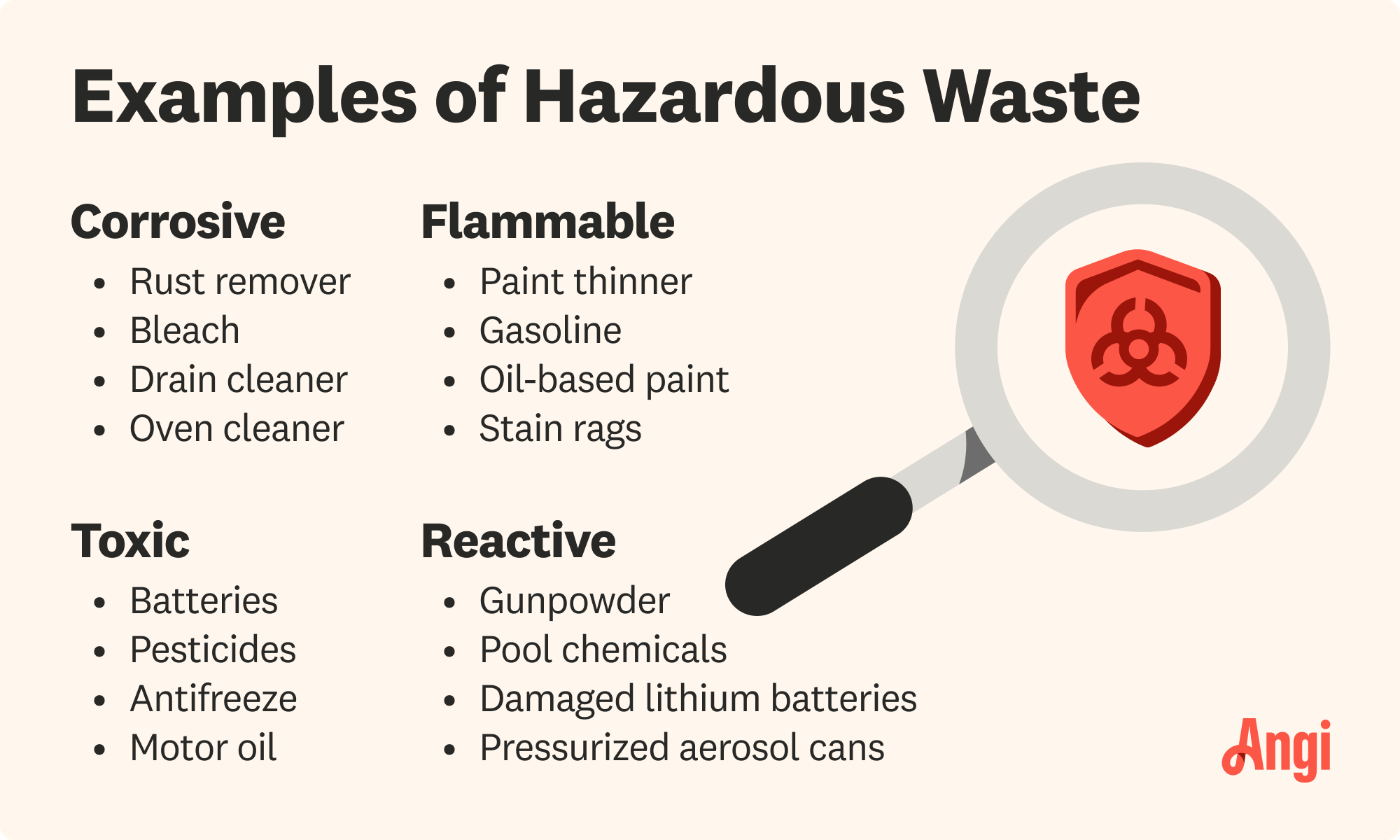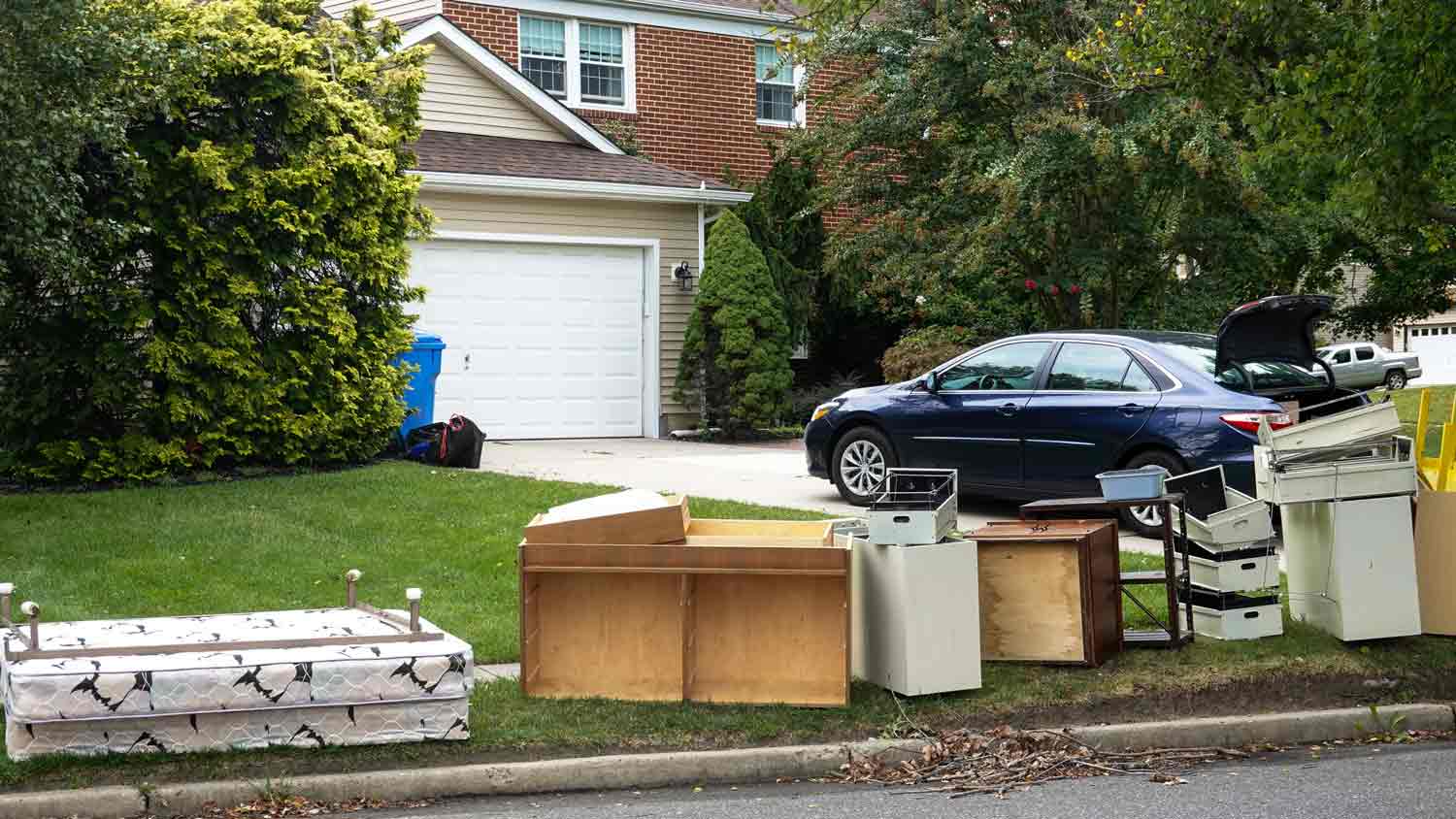
Mattresses are considered hazardous waste, so you’ll likely have to pay disposal fees. Use this guide on mattress removal costs to see what your total will be.
Ammonia can do serious damage to you and the environment, so discard it with care


There is some natural apprehension around ammonia. It's a highly corrosive cleaner with a strong smell that creates seriously toxic fumes if mixed with the wrong chemicals. However, disposal is simple and can be done safely as long as you take the proper precautions. Use this guide to learn how to dispose of ammonia and ensure you get it right.

Ammonia is an extremely corrosive chemical harmful to humans and animals, per the EPA. Contact with bare skin can cause irritation or chemical burns. Prolonged exposure to ammonia fumes can irritate the eyes, nose, and throat and cause breathing problems, headaches, and dizziness. If it leaks into soil or water supplies, ammonia can kill plants and fish and lead to harmful algae growth.
If you have other chemicals to dispose of in addition to ammonia, get rid of the ammonia separately first and rinse all plumbing and containers thoroughly before disposing of the others. Mixing ammonia with other chemicals, especially bleach, can produce poisonous gas. When it comes to how to dispose of bleach properly, ammonia should not be anywhere nearby.
Other precautionary measures to take while disposing of ammonia include:
Wearing protective gloves, eye goggles, and a face mask to cover your mouth and nose
Clearly labeling containers containing ammonia, especially if storing them before disposal
Thoroughly ventilating the area by opening windows and doors and running a fan

Wearing safety gear in a well-ventilated space, begin by diluting the ammonia with water to reduce its potency. The easiest way to do this is to turn on the tap in your sink and slowly pour the ammonia in as it runs. Alternatively, you can flush small amounts of ammonia down the toilet, though this will take longer.
Ensure that you do this slowly enough that there is more water than ammonia going down the drain or toilet at once. Otherwise, you run the risk of contaminating your groundwater supply or damaging your plumbing. If you have a septic system, you can avoid this risk entirely by skipping this step.
It’s important to know how to neutralize ammonia before handling it. If you have spilled any ammonia, or you wish to avoid pouring or flushing it directly down the drain, you can use an absorbent mixture of cat litter, baking soda, dry sand, and sawdust to neutralize it.
Combine any or all of these components in a large container to create your mixture. You can then spread the mixture onto any spills or slowly pour liquid ammonia into the mixture, taking care not to oversaturate it. Once the ammonia has been absorbed, sweep up the solid waste and dispose of it in the trash.
Ammonia containers can still contain traces of ammonia and produce harmful fumes. Before tossing or recycling empty ammonia containers, thoroughly rinse them with water to remove these trace amounts. Thoroughly rinse the sink afterward as well.
Hazardous waste removal costs anywhere from $75 to $500. Pros must exercise caution when handling ammonia, so it tends to cost more than regular household waste. Expect to pay $4 per pound plus a transportation fee of $75 to $200 to cover the cost of taking it to a dedicated disposal facility. Contact a local waste removal specialist for a detailed quote and consider having all your junk hauled away at the same time to save on costs.
For the most part, you’d be hard-pressed to find a plumber, cleaner, or other professionals to come by and dispose of your ammonia for you. However, you can hire a local junk removal company to take just about anything off your hands. If you’re only getting rid of a little bit of leftover ammonia, it’s probably not worth the cost of junk removal, though.
From average costs to expert advice, get all the answers you need to get your job done.

Mattresses are considered hazardous waste, so you’ll likely have to pay disposal fees. Use this guide on mattress removal costs to see what your total will be.

Get clear answers on oil tank removal costs, including average prices, key factors, and ways to save. Learn what impacts your project and how to budget.

Need to get rid of paint, solvents, or other chemicals? Use this guide on hazardous waste disposal costs to see what professional removal will cost.

Whether you’re moving out or simply spring cleaning, junk removal can be chaotic. We’ve eliminated the stress with this simple junk removal checklist.

Grills are bulky, which means your regular sanitation schedule likely won’t account for disposal. Learn how to dispose of a grill properly and affordably.

If you’re doing a roof replacement project, you might be wondering: Can asphalt shingles be recycled? Discover how to recycle asphalt responsibly.